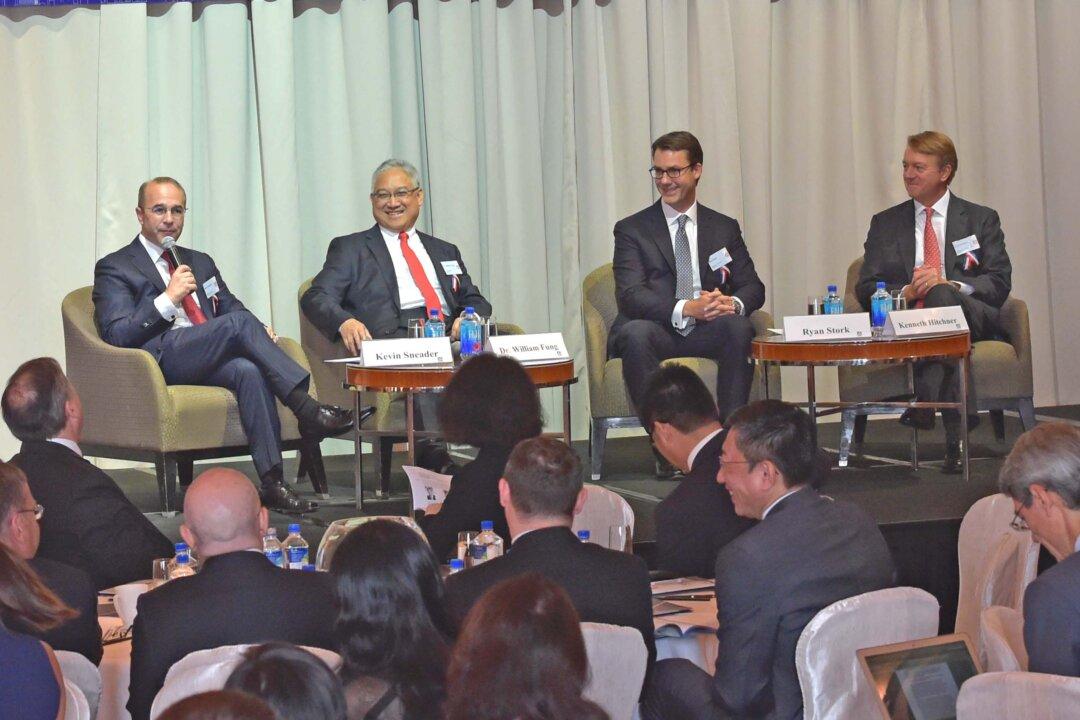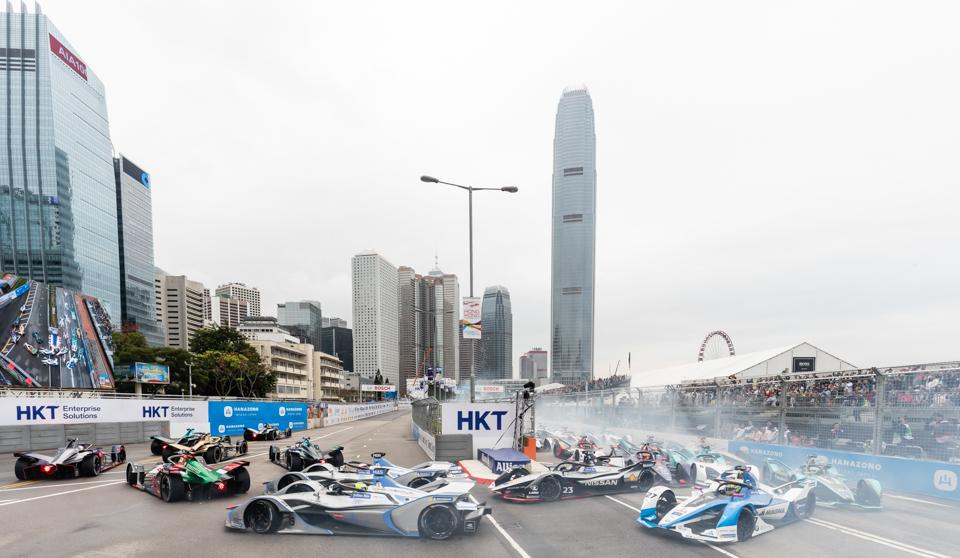HONG KONG—The AmCham China Conference 2016 was held on September 9 with the theme of Managing the Transition: Foreign Business in the new China.
The conference was attended by leading experts in the industrial, financial, legal fields, and prominent figures in the trading and human resources sectors which have been vesting interests in mainland China in the past two to three decades.
Kurt Tong the newly appointed Consul General of the United States, Hong Kong and Macau gave the opening address. This was his first public appearance since taking up his appointment just 3-weeks earlier, he kept his remarks to general introduction points about the conference and did not elaborate on the Hong Kong/China situation.
The scene was set by keynote speaker Christopher Johnson, Senior Advisor and Freeman Chair in China Studies Centre for Strategic and International Studies (CSIS), saying the topic of the conference in essence is the same as last year – doing business with China but the focus this year was doing business in the “New China”.
In foreign police terms, he emphasized China’s continual push in the South China Sea, the Scarborough Shoal is now under China control without consequence. However, he made the point that China walks to the line, pushes, but knows when to stop. “This is very frustrating to deal with” he says. “Is the US likely to start a war over a few rocks”, he asked?
He pointed out that over the last year Xi Jinping had further consolidated China as a global power and at the same time Xi had advanced his own position as a global leader. In the G20 he saw China as achieving much of what it wanted.
On the domestic front, he sees Xi as a strong leader with a definite plan, currently focused on consolidating his power before the upcoming Party Congress, rather than being immediately concerned about economic issues.
Johnson says although debt levels continue to increase and growth is slowing “Policy issues are important rather than economics – pragmatism has taken over”.
Xi’s anti-corruption drive has continued over the past year and he sees this continuing at least up to the Party Congress. He left an open question “Who will fall?”
In contrast he sees Li Keqiang task to deliver on the growth targets, although hitting the 5-year plan target is more important, a slower growth of 5% to 6% this year is still fast by world standards and is seen as acceptable.
Consensus
Speakers and panelists all agree that China is at a new but more complex stage but that most foreign businesses are still looking forward to collaboration in China, with China, though most admitted that in negotiation over the border “they want it on their terms”.
China under President Xi, who other than consolidating power, also concentrates on improving soft power, firmly believes that foreign firms need China more than the other way around.
William Fung, Chairman of Li & Fung Limited which group has long term experience in China see the development of the country since the current regime took over in 1949 in a timeframe of multiple 30-year phases; despite its officials often referring to their 5-year plans.
From 1949 till 1979, China was lost in isolation with the only openings to the outside world at the annual Spring and Autumn Fairs while the rest of the world went through globalization without China.
From 1979 to 2009 saw a lesser grip, prompting a relatively progressive economic development from state owned enterprises to individual hands. Despite Zhu Rongji’s advocate to dissolve SOE, the government still liked to control all, including all labour unions. The drastic structural change in the overall landscape however came only in the Spring of 2010 with a series of suicides committed by desperate workers which prompted a raise in double wages in general in the labour force. They see a third phase of 2009 to 2039 a booming age for domestic consumption, with e-commerce giving a revolutionary impact on all.
With a promised growth of 6-7 %, Xi focuses on a delivery of 5-6% GDP, while realizing that labour intensive industries have moved to other countries. He prioritizes economic growth as supremacy in his reforms which are somehow held back with ’the system' with corruption deep rooted in all walks of life. He illustrated his point with an example that a student will be deprived of proper chance of education at school if he/she does not bestow gifts to the teacher.
China welcomes investment for export and talk of ’smart manufacturing' and the importance of leveraging new technology levels, for example, offering highest quality steel at lowest price, to this end, although they have excess steel-making capacity, China is currently setting up an advanced steel manufacturing plant to produce high quality specialist steels. However, they think investment to supply China’s domestic market will only be opened up slowly. China is seen to be fiercely protective of key areas of its economy.
Fung sees China as a world leader in electronic systems and e-commerce and he sees this as upsetting the established supply chain with huge employment consequences.
All speakers at the panels see the surge in the need for better quality of life, quality food and quality feed after the food poisoning scares. They see this as an opportunity for foreign technology companies. The President of BASF, with a history of more than 130 years of operation in China, set its largest Asia Pacific R&D and industrial design campus at Pudong, sees China as still open to partnering and is becoming more open to law enforcement and looking for sustainable long term developments.
While the Chinese are still price sensitive, most speakers see that in a country with a growing number of highly educated and talented overseas returnees, given the food scares, consumers there are more quality driven. 2015 saw an income growth at 8%, with a high saving rate, there is a surge in the need for better quality of livelihood. Despite an expectancy of a lower income growth rate this year, the new economic richness still prompts the locals in general to look for quality and long term sustainability. Cities like that of PuDong which were built on models out of competition do not fit the now more refined citizens, quality values are more recognized.
Financial
From a financial perspective several speakers see big opportunities in further investment, in the Shanghai and Shenzhen Stock connect and in M&A activities with 55% growth to US$781 billion from 2014 to 2015, and M&A this year is already at US$467 billion (21% of world M&A). They see continued investment important to allow companies to flourish.
Michael Falcon of JP Morgan says “The demand is enormous the capacity for companies or individuals in China to invest in truly regional or global product is measured in billions if not trillions of dollars”.
Mark Austin, CEO of the Asia Securities Industry uttered more cautionary remarks saying he sees the scene changing in the next 3, 5, 10 years from business being directed through Hong Kong to China and vice-versa, to more direct business activity from and to China.
He sees double layer costs in the HKEX-Shanghai/Shenzhen stock connect and that this will drop away to direct connect for efficiency reasons. But Austin also thinks there is a lot of expertise and capability in Hong Kong, however he thinks Hong Kong will have to work hard and recreate itself.
Moderator Lisa Jucca of Reuters, agreed that Hong Kong has much capability and still much to offer China in the coming years. She also thinks that the rate of change in China’s financial regulations will take place at a much slower pace.
How long will it take China to fully open its capital account and capital markets – she asks? I think it is going to be slow they have a big debt problem and if you have a big debt problem you will want to try to keep that money at home. So it will be a gradual process.
How long will it take China to get its legal systems, copyrights and all these things to be on par with Hong Kong? I think that will be a long time as well.
“So Hong Kong still has those unique advantages although we have to fight for the business it will not just fall into our laps. Hong Kong still has a lot of advantages” she explained.
The conference continued with a luncheon address was by Huang Yiping, from Peking University followed by closing remarks by AmCham President Richard Vuylsteke.




